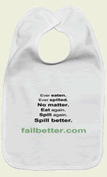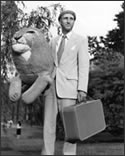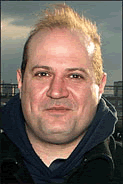|
||||||||
|
|
||||||||||
|
|
Robert Cohen
|
||||||||||
| * * |
Did it really take three successful novels to convince someone to publish your short stories? Having previously published short fiction in Harper's, GQ, Paris Review, and Ploughshares - exactly how many years of work does your new collection cover?
Yes, it did take three novels to convince someone
to publish the stories-or for that matter to look at the stories.
The key word in your question is "successful". My first two
books were hardly successful in the commercial sense; neither sold a
lot of copies. It didn't help that in between I spent four years on
a long, unwieldy project about the CIA drug experiments, set in the
l950s, which ultimately I had to shelve for the simple but melancholy
reason that I just couldn't make it convincing, even to myself. For
a young writer, that sort of experience either makes you more long-view
and cunning about your vocation, or more tentative and passive about
putting your work forward. In my case it did all those things at once.
So even though I'd been publishing two or three stories a year over
the course of about a decade, I never felt much urgency about a collection.
Then after Inspired Sleep came out, I was talking to my friend
and former editor, Ted Solotaroff, and he asked what was going on with
the stories, and I mumbled the usual nothing in my usual mumbly, semi-resigned
way, and he said, "Put them together and publish them now."
So I did. I'm very impressionable in these matters. Only the last story,
"Influence", is brand new. I felt I had to do something to
make the book feel current-I mean, current to me, not anyone else.
The stories in The Varieties of Romantic Experience range
from hilarious tales-like the title story or "Oscillations"-to
disturbing observations of reality-as in "The Boys at Night"
. How quickly in the process of putting the words down on paper do you
know which way you're inclined to go? Having often been compared to
the comic geniuses of Bellow and Roth, is there ever a part of you that
feels pressure to explore the more humorless side of life?
I suppose I'm one of those people who think-or rather, feel-that the highest form of seriousness is humor. I don't value humorlessness in fiction any more than I do in quote-unquote real life. I mean, I'm all for melancholia and depression and inertia and uncertainty, and desperate fumbling towards unattainable resolutions: those are my subjects. But to go after them in a straightforward way would be fruitless or dull. You need contrast, some leavening agent to keep you from sinking into the bog of your own temperament. Look at Kafka, Gogol, Roth, Bernhard, Cheever-in their hands, the terrors of the self are both monstrous and silly at the same time, and this makes them awfully (in both senses of that word) funny. The hard thing, as your question suggests, is getting the mix right. Sometimes I've taken out semi-funny lines because they sound like jokes, mere entertainment. Probably I haven't done that enough. What I really like is a kind of tonal betweenness. You get it in Chekhov, as everyone loves to point out: it's constantly messy and surprising, a very odd, penetrating, hybrid form of realism. Never either/or, always both/and. I value that sort of thing more and more.
You seem to be having a lot of fun with story formats these days, whether it is a classroom lecture in "The Varieties of Romantic Experience: An Introduction," the alternating points of view of "Points of Interest," or perhaps even more evident in your most recent novel, Inspired Sleep, with its use of press releases, newspaper articles, email correspondences and chat room experiences. Why use these typical non fiction formats to forward your story?
I've always been sort of half-interested in formal experimentation. I don't prize it as an end in itself, when cleverness is the only thing driving the bus; but at the same time it can yield a fresh alertness to fictional possibility that's all to the good. Stories, with their more immediate gratifications, are a nice place to play around with outside-in approaches, and see if they go somewhere. "The Varieties of Romantic Experience" came all at once; the second he opened his mouth the angle on the story was clear. A more conventional approach wouldn't have yielded that, I don't think. As for the novel: I was trying to find a way to weave a web of social reality around the two main characters, and the use of "found" formats was a kind of shortcut to that. Also it was easy and fun to do, no small thing when writing a novel. I think you find technical solutions to instinctual worries, and then you go with them.
With regard to your last novel, you must have done some significant research on the medical research and development game, but we can't help but wondering if you had any more personal research when it came to the book, by this we mean, have you ever suffered from any bouts with insomnia? What indeed was your inspiration for the exploration of this . disorder?
No insomnia until the book came out. Then it was payback time. But really, it wasn't the sleep angle that interested me at first. It began as a meditation on psychopharmacology in general, anti-depressants, artificial enhancements. The sleep stuff came in later, when I needed to find a specific disorder for the character. It helped the research that pretty much everyone I know on this planet has problems sleeping, and has become obsessed with the search for relief of this problem. It just doesn't happen to be one of mine.
For two tangentially intertwined characters, the interaction between Bonnie Saks and Ian Ogelvie is limited to just a few encounters. Was this intentional? Did you ever feel, during the process, that you had to fight the urge to get them "together" more in the course of writing the novel?
Yes. Even as it was I wound up bowing to external pressure, and putting in a brief scene with both of them at the end. You're very aware when you're dealing with two separate arcs that all readerly expectations will focus upon their convergence. So it was either very brave or very stupid to resist that. Still, as a reader I tend to resist plot contrivances in general, and most shapely gestures towards resolution. The picture I had in my head was more a kind of billiard ball effect, where the two bodies would send each other along altered but still indeterminate trajectories by virtue of their brief, glancing collision. I don't know if I attained that or not. But I'm pretty sure that the way I wrote it guarantees it won't ever be turned into a movie.
You started out with a mostly all male character first novel, The Organ Builder, then came the rather intriguing supporting female character of Magda in The Here and Now-and now we have the main woman character of Bonnie Saks in Inspired Sleep. Assuming that there is some sort of progression here, and noting the importance of adolescent characters in your latest novel, any chance you may have a lead child character in your next book? As a real life father, do you see this as something you may wish to tackle as a writer at some point?
I don't think I'm headed in that direction, but who knows? The pleasures of working with a female character were considerable; I felt like she was teaching me something. My other protagonists have been more like me, I guess. I wanted a different form of anger, and of tenderness, and of regard for time. No doubt having children gives us more access to these things: they were probably in me somewhere, on the rise. But having a protagonist who is also a mother helped me get at them, I think.
Who are your favorite authors? On your list, would we find more short story writers, or novelists? In terms of contemporary fiction, which form (i.e. - short story vs. novel) do you find yourself reading more often? And why?
I probably read more novels than stories but I can't
say why, or even if, this is actually true. I'm just coming out of a
period where I stopped reading novels because I was bored, basically,
with the long form, or maybe with myself. But then I read Naipaul's
House for Mr. Biswas and it got me interested again in a new
way. That slow becoming, those dry, indirect accumulations of feeling.novels
get at that sort of thing and nothing else quite does. Still, I'm a
sucker for almost any language that's better than pretty good, whatever
container it arrives in. Babel, Bellow, Barthelme, Beckett, Borges,
Bernhard.see, here I am stuck on the B's, that's how useful these lists
are. I have a weakness for books about painters, Guston, Rothko, those
John Berger books, James Lord. I like quirky nonfiction of a meandering,
self-indulgent nature. Like all writers I go back a lot to draw upon
certain works that continue to speak to me, and a hell of a lot of other
people too of course, with a singular intensity. Gogol's "Nose,"
for instance, I've always taken very personally. Molloy. "The
Kiss." Nabokov. Light Years. A Handful of Dust. Elkin. Cheever.
Paley. Invisible Cities. Fitzgerald. Dog Soldiers. "The
School". Great Jones Street. Housekeeping. Bruno Schultz.
I Would Have Saved Them If I Could. Humboldt's Gift. There's
one chapter of that novel I've read maybe fifty times. It has nothing
to do with anything, plotwise. It's about the older brother, Ulick,
who's about to undergo heart surgery. Just seeing him eat loquats from
a tree and spit out the pits. There's something so shrewd and rapturous
and loving there that it makes me want to write a lot better and more
full-throatedly than I ever have or ever will.
Our last and by far most important question: Have you ever been confused with the Robert Cohen, author of Milk: The Deadly Poison? More importantly, to your knowledge has Mr. Cohen be mistaken to be you? Perhaps there lies the potential topic for your next work - mistaken identity?
I'm kind of an agnostic on the subject of poisoned milk, but I'm happy to believe I should be angrier about it than I am. As for this whole name thing, yeah, it's true, there's a large, as-yet-unorganized fraternity of Robert Cohens walking around out there, feeling vaguely defensive and sheepish about how often we're confused with each other. Someone wrote a piece for a magazine about it and sent it to me. Or maybe he intended to send it to a different Robert Cohen. But he had a very familiar name.
© failbetter.com







